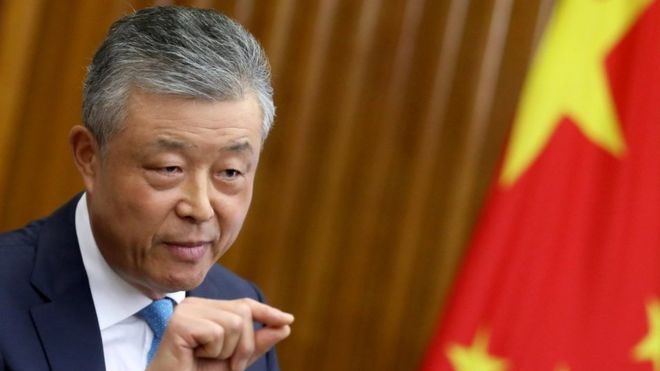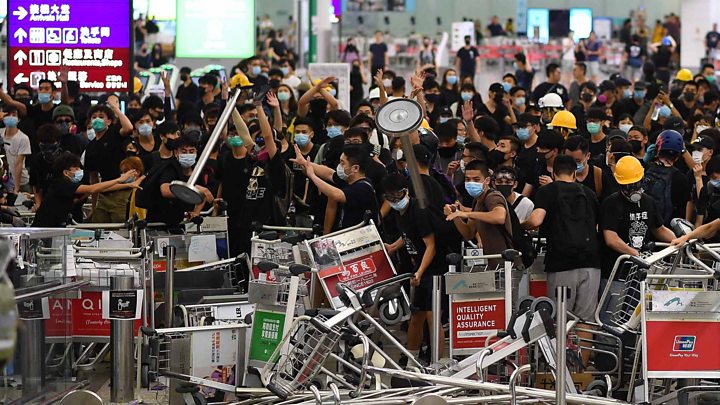 China's ambassador to the UK has warned British politicians against interfering in Hong Kong's affairs, amid clashes between protesters and police.
China's ambassador to the UK has warned British politicians against interfering in Hong Kong's affairs, amid clashes between protesters and police.
Liu Xiaoming said the UK should "refrain from saying or doing anything that interferes or undermines the rule of law in Hong Kong".
Some British politicians think "their hands are still in the colonial days", he told a press conference in London.
The UK has called for "calm from all sides".
Millions of Hong Kong citizens have taken part in 10 weeks of anti-government protests, demanding democratic reform and an investigation into alleged police brutality.
While many of the demonstrations were peaceful, an increasing number have ended in violent clashes with police.
Mr Liu's warning comes days after the Chinese foreign ministry told Foreign Secretary Dominic Raab to stop interfering in Hong Kong's affairs.
He accused some British politicians of viewing Hong Kong as "part of the British empire".
He made the comment in response to a question about a proposal by Commons Foreign Affairs Select Committee chairman Tom Tugendhat to extend UK citizenship rights to Hong Kong Chinese.
"I think some of them still regard Hong Kong as part of British empire and they treat Hong Kong as part of the UK," Mr Liu said.
"They are going to have to change their mindset, put them in the proper position and regard Hong Kong as a part of China, not as a part of the UK," he added.
Analysis
By James Robbins, BBC diplomatic correspondent
China's Ambassador in London was forthright and uncompromising.
Liu Xiaoming can be relied on by Beijing to deliver strong messages in the clearest of English.
He is proud of having served in London for almost 10 years, since Gordon Brown was prime minister.
Now he is warning that Beijing is ready to intervene in Hong Kong with its own security forces if China judges that necessary "to quell the unrest swiftly".
He is broadening complaints of foreign interference - talking of unnamed "foreign forces" and accusing Britain in particular of interference in what he regards as purely a Chinese internal matter.
British government pressure for substantial dialogue in Hong Kong is simply rejected.
British politicians are dismissed as continuing to live in their imperial past.
But any deployment of Chinese military police or other security forces over the border and into Hong Kong would be a huge and risky step - posing its own threat to the strictly limited autonomy of Hong Kong, which foreign investors and traders still clearly value highly.
So, for now, the warning remains just that.
Hong Kong, which was a British colony until 1997, is a special administrative region of China, giving it greater independence.
The Sino-British Joint Declaration signed in 1984 said Hong Kong would enjoy a "high degree of autonomy, except in foreign and defence affairs" and be "vested with executive, legislative and independent judicial power".
Mr Liu questioned whether the government would allow protesters to commit "crimes" in the UK.
"Would the UK allow extremists to storm the Palace of Westminster and damage its facilities and get away with it?" he said.
"Would the UK give permission for attacking police officers with lethal weapons or set fire to police stations without any punishment?
"Would the UK allow so-called pro-democracy rioters to occupy the airport, obstruct traffic, disturb social order or threaten the safety and people's life and property?
"Aren't all these regarded as crimes in the UK?"
In recent weeks protesters have stormed the Chinese government office in Hong Kong and defaced the national emblem, and also laid siege to police stations.
Some protesters argue they have been forced to resort to more confrontational tactics, as peaceful protests have not worked.
Mr Liu also condemned unnamed "Western politicians and organisations" for lending "support to violent radicals" and trying to "obstruct Hong Kong's police from bringing the violent offenders to justice".
"Foreign forces must stop interfering in Hong Kong's affairs," he said.
"Evidence shows that the situation in Hong Kong would not have deteriorated so much if it had not been for the interference and incitement of foreign forces."
Activists in Hong Kong have denied that foreign governments are involved in the movement, while observers say the protests have largely appeared leaderless and unpredictable.

Media captionComedian Bill Bailey witnesses "chaos" at Hong Kong airport during the protests on 13 August
The protests initially started after Hong Kong introduced a bill in April that would allow those accused of crimes against mainland China to be extradited there.
The bill's critics said the move could endanger activists and journalists, and result in those accused facing unfair trials and violent treatment.
The bill was suspended in June after hundreds of people took to the streets in protest.
No comments:
Post a Comment